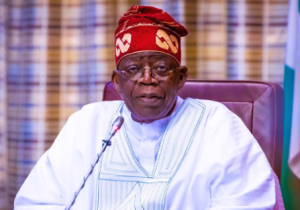 President Bola Tinubu, speaking at the Special World Economic Forum in Riyadh, Saudi Arabia, highlighted the significance of discontinuing fuel subsidy payments in Nigeria.
President Bola Tinubu, speaking at the Special World Economic Forum in Riyadh, Saudi Arabia, highlighted the significance of discontinuing fuel subsidy payments in Nigeria.
According to Tinubu, his administration’s decision to remove the subsidy played a vital role in averting the country’s bankruptcy, despite the economic challenges it brought. Tinubu, who took office in May, emphasized that the savings from the subsidy removal would be allocated towards infrastructural expansion.
While the discontinuation of fuel subsidy resulted in temporary instability in the Naira’s value and increased food prices, Tinubu defended the action as a necessary step to reset Nigeria’s economy towards growth. He acknowledged the difficulties faced by the citizens and assured that parallel arrangements were implemented to alleviate the impact on vulnerable populations. Tinubu emphasized that the government shared the burden across the board and extended support to those most affected.
Tinubu also addressed the unification of the Naira exchange rates, describing it as a crucial measure to eliminate artificial value and promote transparency in the currency’s valuation. He argued that unifying the exchange rates allowed the Naira to compete on a global scale, reducing opportunities for corruption and arbitrage.
Highlighting the importance of stability and economic prosperity in West Africa, Tinubu stressed the need for collaboration rather than conflict among regional nations. He called for increased trade and emphasized the significance of growth, stability, and economic prosperity for the people of the region.
Moreover, Tinubu drew attention to the root causes of poverty and instability in the Sahel region of Africa, urging global leaders to address these issues. He emphasized the necessity for sustained economic collaboration, inclusiveness, and capital infusion to drive growth and exploit the mineral resources available.
As Chairman of the ECOWAS Authority of Heads of State and Government, Tinubu highlighted Nigeria’s efforts to discourage unconstitutional changes in government and promote trade and economic prosperity in the region. He urged larger economies to actively participate in supporting the growth and development of the Sahel region, emphasizing the importance of inclusive programs that provide economic opportunities for all.
The Special World Economic Forum in Riyadh, attended by over 1,000 leaders from various sectors and countries, aims to address pressing global challenges and promote collaboration, inclusive growth, and energy development.

